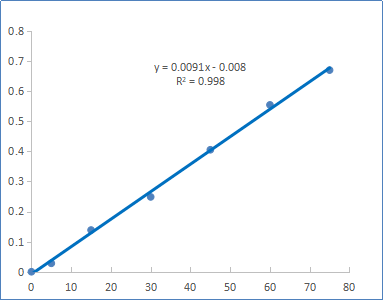| Product name | CheKine™ Micro Catalase (CAT) Activity Assay Kit |
| Applications notes | CheKine™ Micro Catalase Activity Assay Kit provides a simple and easy colorimetric assay for the study of catalase activity in a variety of biological samples such as cell and tissue lysates or biological fluids. This assay kit utilizes the peroxidatic function of catalase for measuring catalase activity, based on the reaction of catalase with methanol, with the presence of an optimal concentration of H2O2. The formaldehyde produced can be measured colorimetrically at OD 540 nm. Therefore, the catalase activity present in the sample is proportional to the signal obtained. |
| Kit components | • Assay Buffer • Sample Diluent • Formaldehyde standard (4.25 M) • Catalase (control) • Potassium Hydroxide • Hydrogen Peroxide • Chromogen • Potassium Periodate |
| Features & Benefits | • Determination of catalase activity in serum, plasma, tissue/cell lysates and other biological fluids. • Determining catalase activity directly by utilizing the peroxidatic function of catalase, which can not be interfered by other peroxidases. • A broad range linearity: 2-75 µM. • Measure catalase activity down to 2 U/ml |
| Usage notes | • If not assayed immediately, samples can be stored at -80°C. • Overheating can inactivate catalse. The enzyme should be kept cold during sample preparation and assaying. • In general, catalase is very unstable at high dilution. It is recommned to store samples concentrated and assay within 30 minutes afrer dilution. |
| Storage instructions | Storage at -20°C and Keep from light immediately upon receipt. Kit has a storage time of 6 months from receipt. Refer to list of materials supplied for storage conditions of individual components. |
| Shipping | Gel pack with blue ice. |
| Precautions | The product listed herein is for research use only and is not intended for use in human or clinical diagnosis. Suggested applications of our products are not recommendations to use our products in violation of any patent or as a license. We cannot be responsible for patent infringements or other violations that may occur with the use of this product. |
| Background | Catalase (EC 1.11.1.6), is a common antioxidant enzyme that catalyzes the decomposition of hydrogen peroxide (H2O2) to water and oxygen, ubiquitously present in aerobic cells containing a cytochrome system. Hydrogen peroxide is highly deleterious to the cell and its accumulation will cause oxidation of cellular targets such as DNA, proteins, and lipids, thus leading to mutagenesis and cell death. Removal of the hydrogen peroxide (H2O2) from cells by using catalase provides protection against oxidative damage to the cell. The role of catalase in oxidative stress related diseases has been widely studied. Catalase also demonstrates peroxidatic activity, in which low molecular weight alcohols can serve as electron donors. Aliphatic alcohols are specific substrates for catalase, however, other enzymes with peroxidatic activity do not utilize these substrates. |

Fig. Formaldehyde standard curve. The y-axis is absorbance of standards and the x-axis is final formaldehyde concentration (uM).
Author:Roy JR, Janaki CS, Jayaraman S, et al. Publication name:Antioxidants IF:7.675
Author:Jia, Lina, et al. Publication name:Ecotoxicology and Environmental Safety IF:6.8
Author:JR Roy, CS Janaki, S Jayaraman, VP Veeraraghavan Publication name:Toxics IF:4.6
Author:HP Xu, XY Ma, C Yang Publication name:Frontiers in Molecular Biosciences IF:4.188
Author: Zhang M, Zhu D, Wan Y Publication name:ARCHIVES OF BIOCHEMISTRY AND BIOPHYSICS IF:4.114
Author:Jing Sun,Mingqiang Chen,Zhengyi Fu,Jingru Yang,Zhenhua Ma Publication name:ORIGINAL RESEARCH IF:3.661
Author:N Liu, S Zhou, OJ Olatunji, Y Wu Publication name:Arabian Journal of Chemistry IF:3.298
Author:Rebecca Roy, Jeane, et al. Publication name:Current issues in molecular biology IF:3.1
You must be logged in to post a review.
1.The species of antibody reactivity should be the sample species that can be matched normally after Abbkine R&D experts have passed strict scientific verification. If your sample is not within the range of reactivity, in order to improve the efficiency and results of your experiment, it is not suggested to try other species. Otherwise, it may lead to sample mismatch and affect the effect of your experiment.
2.Please aliquot the antibody received as soon as possible and store it at -20℃, avoid repeated freezing and thawing, and use it within one year.
Welcome any form of communications, and better service will be provided here.
Tell: +1-404-854-0155
Email: service@abbkine.com
Support Email: support@abbkine.com
Address: 3052 Stroop Hill Road, Apt 203, Atlanta 30303, Georgia, United States of America




Reviews
There are no reviews yet.